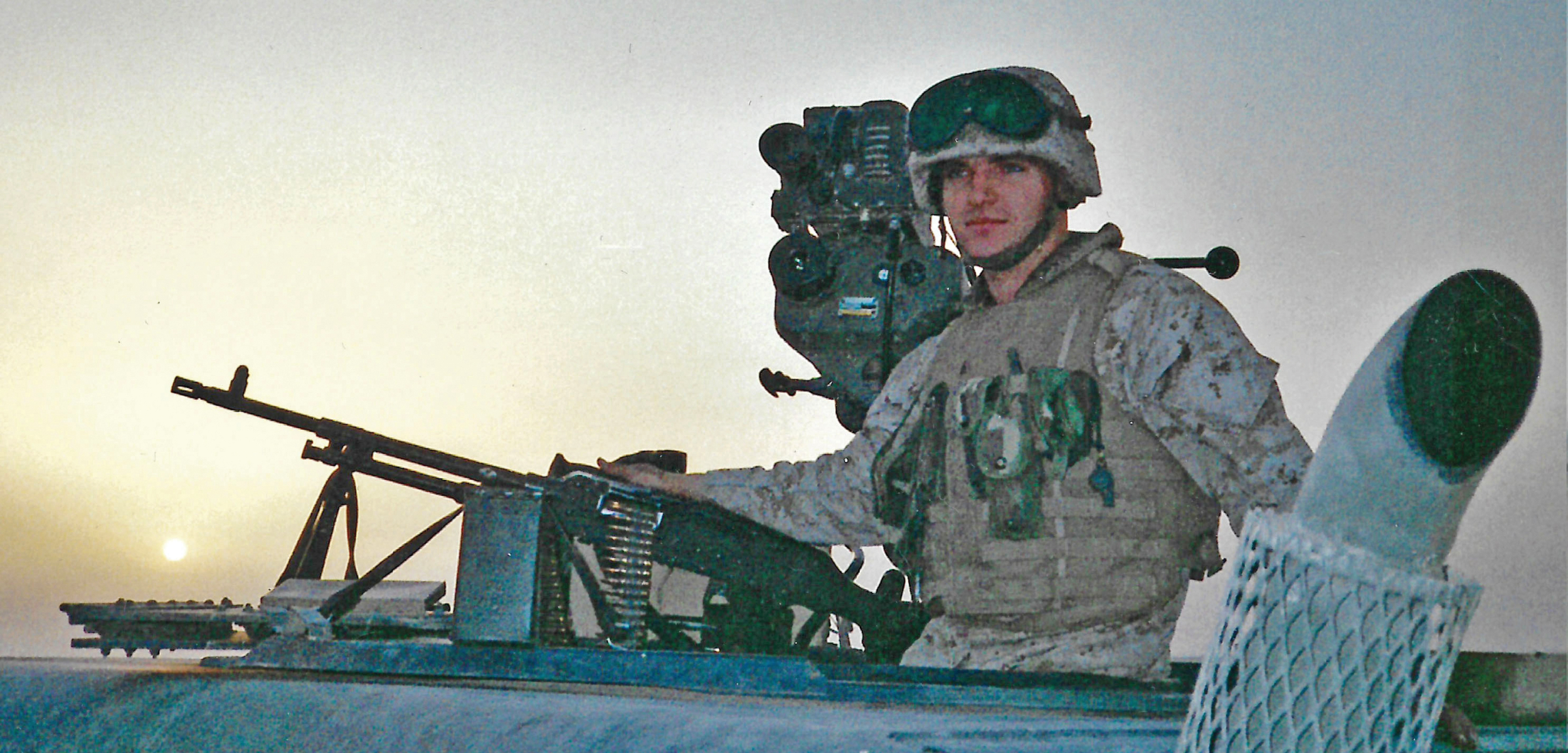
Going to college is hard enough without having to carry with you the emotional baggage of fighting in a war. But anyone who has ever served on the front lines knows that the psychological scars from battle take a long time to heal—if they ever do.
It’s been 18 years since Joshua Keyes took part in the initial surge of the Iraq War with the Marines, and he’s still coping with the after-effects of his two combat deployments to Iraq. The 38-year-old CWU student, who lives with Posttraumatic Stress Disorder (PTSD), said he is still trying to find peace as he works to complete his computer science degree.
“I started college in California as soon as I completed my service in the Marines Corps, and I was two years into my degree program before life situations altered my path,” said Keyes, who re-enrolled at CWU in the fall of 2019. “After 16 years, there are still many challenges to overcome.”
Keyes, who served from 2000-04, said his struggles related to PTSD have worsened as he has gotten older. He often has trouble summoning enough energy to get through a typical day, regularly coping with bouts of memory loss, anxiety, and insomnia. And while he tries to not let PTSD interfere with his daily routine, the effects of his experiences on the battlefield are ever-present.
“It’s definitely a challenge,” he said. “There have been times where I’ve felt like I had dementia because I can’t remember what I’m doing. My mind becomes preoccupied and I become stuck in thoughts and memories—generally from events I wasn’t able to process fully at the time.”
Keyes said his four years of military service also created some social challenges for him when he returned to civilian life. Military culture is unrelenting at times—“more primal,” as he describes it—and once you’ve lived in that world for an extended time, adapting to civilian life can be taxing.
“In the Marines, a leader has no option to shy away from confrontation; you must meet those challenges,” Keyes said. “So, when you are around groups of younger guys who don’t come from the same background, it can be difficult to maintain perspective. You have to recognize and respect the cultural differences and let things go.”
Another CWU veteran, Marcus Jaffe, was never officially diagnosed with PTSD, but he knows he didn’t return home the same as when he left. Things have gotten better since he came back from Iraq in 2005, although the initial reintroduction was anything but easy.
“At first, I had a hard time with loud noises and concentrated groups of people,” said Jaffe, 40, a 2009 CWU alum who now teaches clinical physiology at the university. “I would wake up in the middle of the night from a loud noise and run to the door to see what was there. My wife would have to be careful waking me up because I would go from a deep sleep to being 100 percent awake. Thankfully, that got better. But it lasted for at least a couple years.”
Jaffe was on active duty in the Army for four and a half years, which included a one-year deployment to Iraq in 2004-05. He was “as front line as it gets,” driving supply vehicles from Baghdad to Fallujah. He participated in 63 convoys that year and feels fortunate to have returned home safely.
“It was the real deal,” said Jaffe, a physical therapist in the Army reserves who also serves as the director of rehabilitation therapy at Kittitas Valley Healthcare. “Every few trips, we would have some sort of enemy contact. Most of the time it would be a few gun shots, but there were times where it got pretty serious. Those experiences definitely stayed with me.”
Having spent a year on the front lines, Jaffe has found that he can relate better with disabled veterans in his work as a physical therapist. He may not be suffering from the same injuries as his patients, and his emotions aren’t as raw as they were 15 years ago. But he understands what it’s like to return home from a war zone—and he knows the road to recovery takes time.
“I work with a lot of disabled soldiers, and the hardest thing for them is adjusting to their new reality,” Jaffe said. “In the military, they have an identity that they are proud of and that defines them. But it all got stripped away from them when they got injured. It feels like they’ve lost a piece of themselves, and that plays with their mind in a big way.”
What is PTSD?
Posttraumatic stress disorder (PTSD) is a psychiatric condition known to occur in people who have experienced or witnessed a traumatic event such as a serious accident, a terrorist act, war/combat situations, or who have been threatened with death, violence or serious injury.
PTSD is most often associated with combat veterans, but it can affect anyone at any age. The disorder affects approximately 3.5 percent of U.S. adults every year, and an estimated one in 11 people will be diagnosed with PTSD in their lifetime. According to the American Psychiatric Association, women are twice as likely as men to have PTSD.
People with PTSD have intense, disturbing thoughts and feelings related to their experience that last long after the traumatic event has ended. They may relive the event through flashbacks or nightmares; they may feel sadness, fear, or anger; and they may feel detached or estranged from other people.
If you know a veteran who is experiencing symptoms of PTSD and is in need of assistance, contact the Washington Department of Veterans Affairs at 1-800-273-TALK (8255). More information about PTSD can be found at dva.wa.gov or psychiatry.org.






comments powered by Disqus